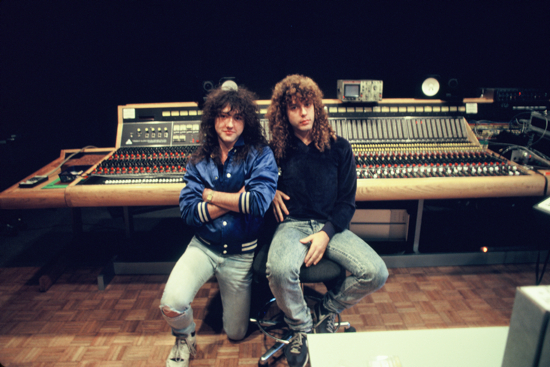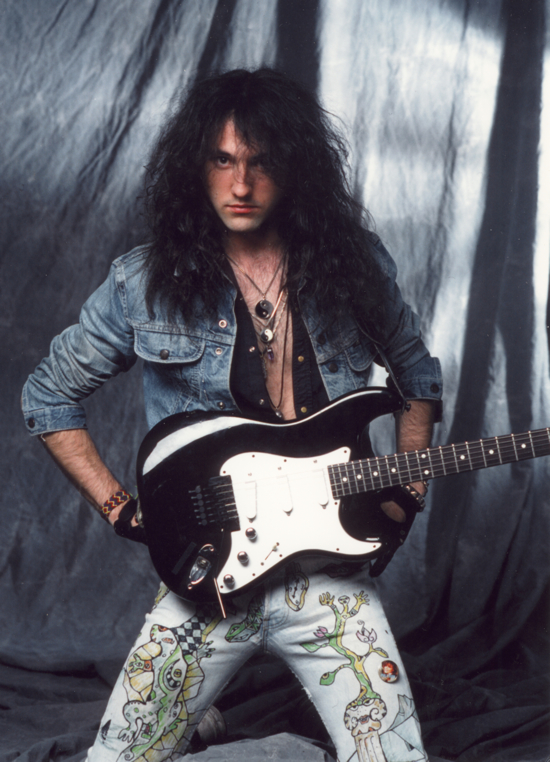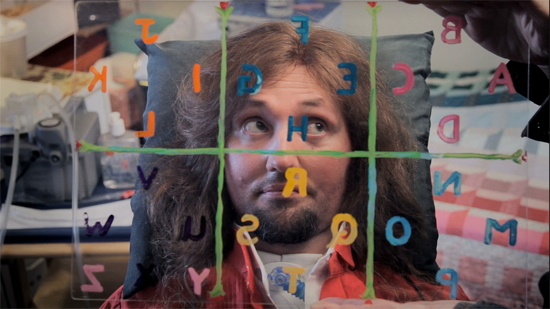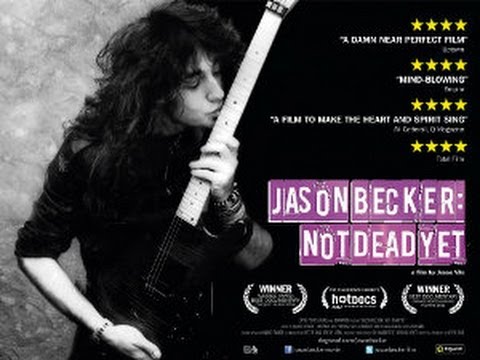The word ‘hero’ has been bandied about far too much this year, thanks to the Olympics and other displays of pageantry. While there are certainly examples of heroism in all walks of life, sporting or otherwise, most common definitions of what is heroic tend to fade into insignificance when you’re told the story of someone who has faced genuine hardship. One of these is Jason Becker, a familiar name to fans of heavy rock guitar playing. Jesse Vile’s documentary Jason Becker: Not Dead Yet offers a new and subtle redefinition of what heroism against the odds really is. Believe me, it will change any right-thinking person’s perspective on the trials that life throws at us, and how human nature responds to the toughest circumstances imaginable.
The facts are as follows. Just over 20 years ago, Becker was a proper spandex-clad guitar prodigy like they used to make. He had the big hair, the stage moves and the advanced musicianship that you needed in the 1980s if you were going to compete with the likes of Eddie Van Halen and Dave Mustaine. By his late teens he was playing splendidly show-off metal in a band called Cacophony with fellow axeman Marty Friedman, who later found fame with Megadeth. After releasing a solo album in 1988 called Perpetual Burn, Becker’s own breakthrough into the international limelight came when David Lee Roth asked the young musician to join his post-Van Halen band when shredder extraordinaire Steve Vai quit. Becker signed up in an instant and duly recorded guitar parts for Roth’s 1991 album A Little Ain’t Enough. However, during the recording sessions Becker noticed some sluggishness in his hands and legs and, on consulting a series of doctors, was told that he had amyotrophic lateral sclerosis, also referred to as ALS, Lou Gehrig’s disease or motor neurone disease. It’s the disease that Stephen Hawking has.
This incurable condition causes the body’s muscles to atrophy, eventually leading to the inability to breathe or swallow, and although tube feeding and mechanical breathing via a tracheotomy can extend patients’ lives, the prognosis is usually that death will occur in three to five years as the sufferer’s body becomes weak and prone to infection. As a specialist interviewed for this film explains, people pray for a brain cancer diagnosis rather than ALS. Following his diagnosis, the 22-year-old Becker stepped down from Roth’s band and began the struggle with his disease that continues today.
You might well think that the impact of ALS on this cocksure, talented kid would be unfilmable, but first-time director Jesse Vile manages to pull it off without becoming maudlin or clichéd. He achieves this by avoiding an overdose of sentimentality or fake emotion, allowing the facts and images to speak for themselves. A comprehensive study of Becker’s childhood and teenage years, devoted largely to playing the guitar and having fun, leads up to the moment when everything changed. Although key players like Roth are absent, a series of expert talking heads, such as guitar wizards Vai and Joe Satriani, place the loss of Becker’s talent in context.
Once the film has reached this point, it becomes a surreal, heartbreaking tragicomedy. In the early 1990s, knowing that his disease is worsening, Becker acts the fool in still pictures, pretending to be dead for the camera – and tells his family and friends, "Hey, you might as well get used to it." The disease moves with unnerving speed and we are rapidly brought up to the present day, where the now wheelchair-bound Becker is fully in its grip. A recently filmed scene where, fully immobilised apart from the movement of his eyelids, he weeps silently, is incredibly poignant.
But there’s also humour here, which to me is the essence of the man’s victory over his condition. The documentary intersperses moments of pathos with its subject’s sense of mischief, notably in the banter which he exchanges with his father via a system of communication that the latter invented. We also see the expert support provided by the Becker family, who explain in detail the nutrients used in his liquid food. Their attention to his healthcare is such that a visiting medic declares Jason’s skin tone to be the healthiest ever seen in an ALS sufferer.
The movie ends, but you’re left knowing that Becker is still there, his brain as active as ever behind the motionlessness of his face and body. He continues to make music via computer programs and has just released a new album, Boy Meets Guitar. At 43, he has outlived the initial prognosis by at least 15 years, without drama, claims of heroism or any fuss at all.
It’s impossible to come away from this remarkable, bittersweet film unmoved. As I see it, what makes Becker a man to admire is the fact that he has retained his humanity, his identity and his sense of humour in a situation that would turn almost anyone else into a bitter, frustrated misanthrope. Life is stacked against us anyway, even in the easy living conditions that most of us enjoy: imagine yourself in Becker’s position. He clearly understands the absurdity of his situation as well as its tragedy, and while the struggle to keep going day after day brings him to the point of despair from time to time, he obviously still enjoys life, as shown by our email conversation.
Thank you for sharing your experience with us, Jason. To what do you attribute your continued success as a musician and a man who has defeated his condition for so long?
Jason Becker: Thank you so very much! Oh, I don’t know what I attribute my "continued success" to. I just keep doing what I do. I need to make music. I don’t want to be unhappy, so I try to be happy. Maybe it is because my music is so great – ha ha! I’m not sure I have defeated my condition so much as it hasn’t defeated me. Now, I just need to figure out how to become a success at making money.
What are the biggest challenges, mental or physical, that ALS places on you?
JB: Physical: losing all movement makes things challenging; luckily, I am set up now, but things constantly need changing, adjusting, rearranging, and that can get somewhat tiresome. It’s difficult to get out much so I miss a lot of things. My eyes get tired at times, and that makes it hard to communicate since I spell with my eyes. I really miss being able to hug my girlfriends, friends and family, pet and play with my animals. I miss being able to crack a quick joke at the perfect time, run around, play basketball, football, drive, eat, and most of all, play guitar and compose music by myself if I want. I miss really being alone and having privacy.
Mental: I have dark moments. I sometimes wonder what it’s all about and why I work so hard for something I want that often doesn’t come to be. I worry about hardships, money, being in a completely vulnerable position, etc.
Jason with Marty Friedman

I loved your work with Marty Friedman in the Cacophony days. How did you and he complement each other as guitarists?
JB: Thank you again! I think we complemented each other as guitarists by just sharing who we were and what we had, with each other. We were lucky because we were both serious musicians and wanted the same thing: to be taken seriously and to be innovative in our own ways. My way was young, energetic and I was like a sponge, learning everything Marty had to teach me. His way was more experienced, exotic, with lots of thinking outside the box. We learned from each other and we both complemented each other, both musically and personally. We will always be brothers. I wouldn’t be the musician I am today without his influence. When composing now, if I get stuck I ask myself, "What would Marty do?"
What memories do you have of working with Dave Lee Roth?
JB: Mostly memories of fun and being so happy with the fact that I got the gig. I wanted to step up and be brilliant, but I kept having to deal with annoying physical things happening to my body. I didn’t have time to get too involved with anything but music while I was making the album, so most of my memories are of playing with my friends, trying to make great music, hanging out with people and having fun. I was getting weaker and weaker, and though I was determined to finish the album I began to realise that I probably wasn’t going to make the tour. Dave and the whole band were so cool to me. We had some fun, wild times. [DLR’s other guitarist] Steve Hunter and I became the best of friends. He would give me vitamin B-12 shots and clean my wounds when I fell.
How have your composing tastes and skills evolved over the years?
JB: They have just evolved as I have had time to explore more music and musicians through the years. I love for music to have emotion and feeling, so I hope my music sounds like a story with a certain mood which people can interpret themselves. I love how music can feel happy, sad, angry, dramatic, epic, peaceful, fun, silly, humorous. For me, the best music makes me feel something. I have gotten more into modern classical and world music. I seem to be even more open to the limitless music inside me and all around us. My skills have always been pretty good.
Which musicians have emerged in recent years that you admire?
JB: My list stays pretty much the same, but increases as I discover more. My latest discoveries are Kazuhito Yamashita, the amazing classical guitarist; Morten Lauridsen, the beautiful choral composer; and Hiromi, the incredible jazz pianist. She might be the greatest living musician. I also can’t get enough of Peter Gabriel, Uli Jon Roth, Ennio Morricone and Philip Glass.
Many sufferers of long-term medical conditions develop incredible mental fortitude. Has ALS made you a stronger person?
JB: I suppose so, but I really don’t know. I don’t feel strong necessarily. I just live my life. I know that things didn’t turn out the way I had planned, but after the initial shock of it all, what can you do? When I think about it, I seem strong, but I still make music and I have lots of love and fun and the people around me seem strong too, so it makes me feel humble and grateful, and I also feel the grace of God. I understand the feeling of hopelessness and loss, but I also understand the feeling of love and gratitude. It all depends on what mood you catch me in. I think passion, purpose and love are things that we all need. Those things make us all stronger.
Jason Becker: Not Dead Yet goes on theatrical release from Friday November 16 (with a DVD to follow on December 3); for a full list of screenings check the Dogwoof website. Boy Meets Guitar is out now; samples of Jason’s music and further information can be found at his official site.




